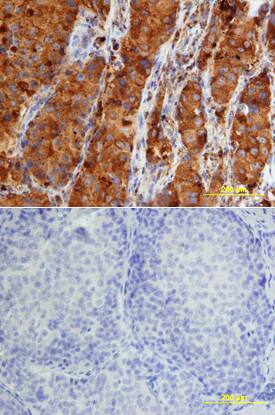Cathepsin D Products
Cathepsin D is a lysosomal aspartic protease of the pepsin family. Human Cathepsin D is synthesized as a precursor protein, consisting of a signal peptide (residues 1 - 18), a propeptide (residues 19 - 64), and a mature chain (residues 65 - 412). The mature chain can be processed further to the light (residues 65 - 161) and heavy (residues 169 - 412) chains. It is expressed in most cells and over expressed in breast cancer cells. Cathepsin D is a major enzyme in protein degradation in lysosomes, and also involved in the presentation of antigenic peptides. Mice deficient in Cathepsin D have been shown to develop a progressive atrophy of the intestinal mucosa, a massive destruction of lymphoid organs, and a profound neuronal ceroid lipofucinosis, indicating that Cathepsin D is essential for proteolysis of proteins regulating cell growth and tissue homeostasis. Cathepsin D secreted from human prostate carcinoma cells are responsible for the generation of angiostatin, a potent endogenous inhibitor of angiogenesis.
48 results for "Cathepsin D" in Products
48 results for "Cathepsin D" in Products
Cathepsin D Products
Cathepsin D is a lysosomal aspartic protease of the pepsin family. Human Cathepsin D is synthesized as a precursor protein, consisting of a signal peptide (residues 1 - 18), a propeptide (residues 19 - 64), and a mature chain (residues 65 - 412). The mature chain can be processed further to the light (residues 65 - 161) and heavy (residues 169 - 412) chains. It is expressed in most cells and over expressed in breast cancer cells. Cathepsin D is a major enzyme in protein degradation in lysosomes, and also involved in the presentation of antigenic peptides. Mice deficient in Cathepsin D have been shown to develop a progressive atrophy of the intestinal mucosa, a massive destruction of lymphoid organs, and a profound neuronal ceroid lipofucinosis, indicating that Cathepsin D is essential for proteolysis of proteins regulating cell growth and tissue homeostasis. Cathepsin D secreted from human prostate carcinoma cells are responsible for the generation of angiostatin, a potent endogenous inhibitor of angiogenesis.
Recombinant Monoclonal Antibody
| Reactivity: | Human |
| Details: | Rabbit IgG Monoclonal Clone #010 |
| Applications: | IHC, WB |
Recombinant Monoclonal Antibody
| Reactivity: | Mouse |
| Details: | Rabbit IgG Monoclonal Clone #102 |
| Applications: | WB, ELISA, IP |
Recombinant Monoclonal Antibody
| Reactivity: | Human |
| Details: | Rabbit IgG Monoclonal Clone #010 |
| Applications: | IHC, WB |
Recombinant Monoclonal Antibody
| Reactivity: | Human |
| Details: | Rabbit IgG Monoclonal Clone #010 |
| Applications: | IHC, WB |
Recombinant Monoclonal Antibody
| Reactivity: | Mouse |
| Details: | Rabbit IgG Monoclonal Clone #102 |
| Applications: | WB, ELISA, IP |
| Reactivity: | Human |
| Details: | Goat IgG Polyclonal |
| Applications: | WB, Simple Western, IHC, IP |
| Reactivity: | Mouse |
| Details: | Goat IgG Polyclonal |
| Applications: | WB, IHC, IP, ICC |
| Reactivity: | Mouse |
| Details: | Rat IgG2a Monoclonal Clone #204712 |
| Applications: | WB |
| Reactivity: | Human |
| Details: | Mouse IgG1 Monoclonal Clone #185111 |
| Applications: | WB, Simple Western, IHC |
| Reactivity: | Human |
| Details: | Goat IgG Polyclonal |
| Applications: | WB, IHC |






